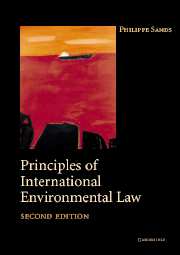Book contents
- Frontmatter
- Contents
- Foreword
- Preface and acknowledgments to the first edition
- Preface and acknowledgments to the second edition
- Table of cases
- Table of treaties and other international instruments
- List of abbreviations
- PART I The legal and institutional framework
- PART II Principles and rules establishing standards
- PART III Techniques for implementing international principles and rules
- 16 Environmental impact assessment
- 17 Environmental information
- 18 Liability for environmental damage
- 19 International trade and competition
- 20 Financial resources, technology and intellectual property
- 21 Foreign investment
- Index
20 - Financial resources, technology and intellectual property
- Frontmatter
- Contents
- Foreword
- Preface and acknowledgments to the first edition
- Preface and acknowledgments to the second edition
- Table of cases
- Table of treaties and other international instruments
- List of abbreviations
- PART I The legal and institutional framework
- PART II Principles and rules establishing standards
- PART III Techniques for implementing international principles and rules
- 16 Environmental impact assessment
- 17 Environmental information
- 18 Liability for environmental damage
- 19 International trade and competition
- 20 Financial resources, technology and intellectual property
- 21 Foreign investment
- Index
Summary
Introduction
The establishment by the 1990 amendments to the 1987 Montreal Protocol of a financial mechanism to address ozone depletion marked an important turning point in international environmental law. In the subsequent decade the rules on finance and technology transfer have developed significantly and substantively, together with legislative and judicial consideration of the relationship between intellectual property rights and environmental protection. This has occurred notwithstanding the early concerns of some industrialised countries that the establishment of the Montreal Fund would adversely prejudice future developments. Financial resources, technology transfer and intellectual property were central issues at UNCED and of the two treaties signed at UNCED. As described in this chapter, the 1992 Climate Change and Biodiversity Conventions – as well as subsequent instruments on drought and desertification (1994), climate change (1997), biosafety (2000) and persistent organic pollutants (2001) have further elaborated the principles established under the Montreal Protocol and its amendments. Related developments – particularly in the context of the activities of the multilateral development banks, the WTO Agreement on Trade Related Aspects of Intellectual Property Rights (TRIPs), the European Patent Convention, and the 2001 International Treaty on Plant Genetic Resources for Food and Agriculture – have added to the broadening range of legal issues which are touched by, and increasingly integrated with, international environmental concerns.
- Type
- Chapter
- Information
- Principles of International Environmental Law , pp. 1020 - 1055Publisher: Cambridge University PressPrint publication year: 2003



